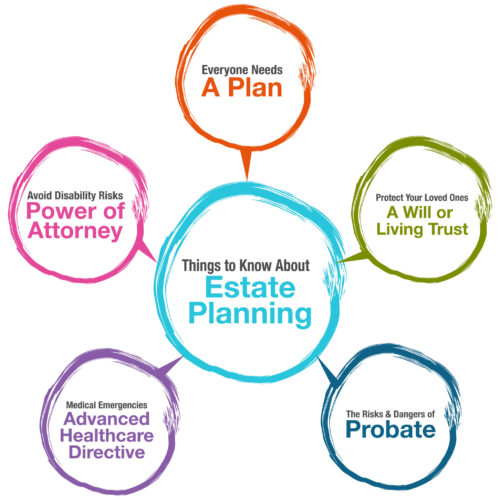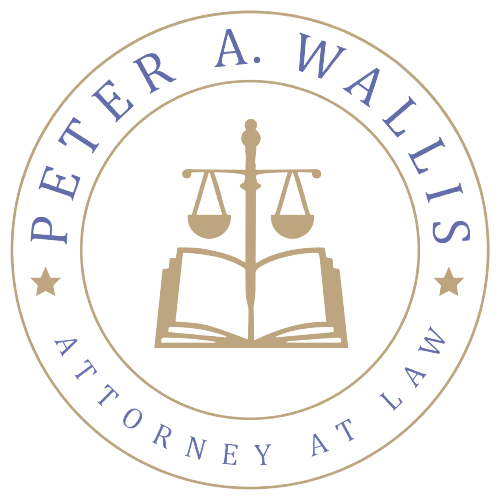Proper Planning Prevents Preposterous Poverty

What are 13 basic problems solved by good estate planning?
- Who will be the guardian of your minor children if you die and there is no other competent parent.
- Who will manage your wealth and property if you are disabled.
- How your property will be managed if you are disabled.
- Who will manage your healthcare if you are unable to decide.
- How you (or your family members) can keep eligible for government benefits and still have benefits of your money.
- Who will control your business if you are disabled and how they are to run the business.
- Who will be the person in charge of distributing your wealth when you die.
- Who your property will go to when you die.
- How to avoid court actions of probate when you die.
- How to reduce or eliminate some kinds of taxes after you die.
- How to avoid will contests and family fights when you die.
- How to dispose of your body and organs after you die.
- What you are going to want people to know after you die.
What is the difference between a will and a trust?
- Both wills and trusts can allow you to transfer wealth to people after you die but here are a few of the many major differences.
- Wills can allow you to appoint guardian’s for your children if you die; trusts can’t.
- Wills can allow you to grant unspecified property after you die; trusts usually can’t.
- Wills (generally) have to go through court actions called “probate” which take months or years and can cost thousands of dollars; trusts don’t have to.
- Wills can be public knowledge so neighbors, family members, or professional con-men can find out what was in the will; trusts can (generally) be privately administrated without disclosing terms to the public.
- Wills are governed by very strict state law. If you use the wrong “magic” language in the will, or don’t properly write or witness your will, parts of it or all of it can easily be invalidated. The law can be stupid and unforgiving for people improperly drafting wills.
What are some benefits of trusts over wills?
- Trusts (generally) can avoid the costs, complications, and delays of probate. This can save tens of thousands of dollars, lots of confusion and frustration, and months or years.
- Trusts (generally) can be used help to avoid some types of taxes.
- Trusts can be used to manage and protect a trust maker’s property while he is disabled even before he dies.
Trusts can be used to regulate the transfer of wealth over years, decades or generations. This can be very useful to prevent minor children, incompetents, or imprudent recipients (also called beneficiaries) from spending all their “gifts” too quickly. It can preserve wealth for future generations.
What is an Advance Medical Directive?
It is a document showing your wishes for your medical care if you become unable to communicate your wishes. It requires your health care providers to follow your directions regarding life sustaining procedures if you have a terminal injury or illness. For instance, it lets someone know if you want someone to just “pull the plug” if you are presumed brain dead or if you want them to keep waiting for you to wake up.
What is a durable power of attorney for finances?
It allows you to specify a trusted friend or family member to legally manage your finances and act for you, if you are incapacitated.

What is the process of estate planning?
- We start with a free initial consultation with you which typically lasts between 15 to 30 minutes where I learn the basics of your situation and I explain to you the basics of estate planning.
- By the end of that meeting, I will give you a set price of how much my services will cost you for an estate plan that is good for you.
- I will have you sign an attorney fee agreement and you will pay me a fee for the work I will do for you.
- I will give you a worksheet of “client homework” or information I need from you about your family, friends, assets and wishes so that I know necessary specifics for drafting your customized documents.
- We have an estate design planning meeting, either in my office or by phone, where I clarify the information you gave me and we review and clarify your wishes in detail.
- I create the documents based on your wishes and I will email or call you to ask follow-up questions as I draft the documents over the next few days.
- We have a “legal document signing” where we either meet in my office or I arrange to have a notary public come to your home or office for you to sign the documents including wills, trusts, powers of attorney, advanced health directives, and perhaps a dozen other forms depending on your plan.
- You take and review the documents over the next 60 days to make sure they are what you want and I make whatever corrections need to be made at no extra charge.
- I will file the deeds at the county recorder and you fund your trust.
- I follow up with you in about 30 days to make sure the trust is funded properly.
- I may contact you once every two or three years to see if you need revisions to your trust.
- When you become disabled or die, I can be available to help your designated executors, trustees, and beneficiaries; typically at additional cost.
